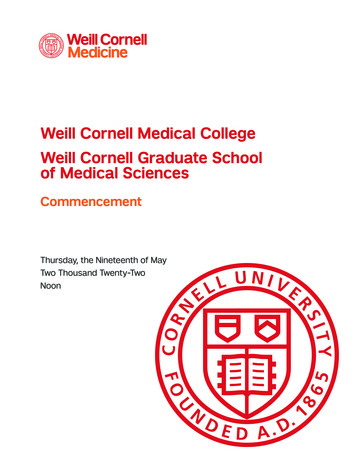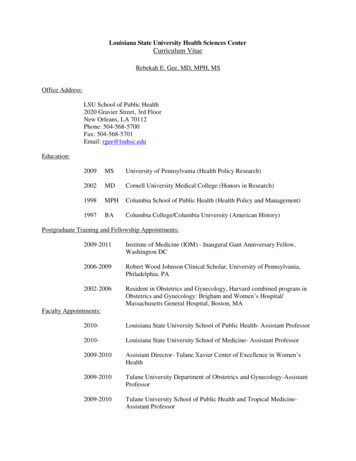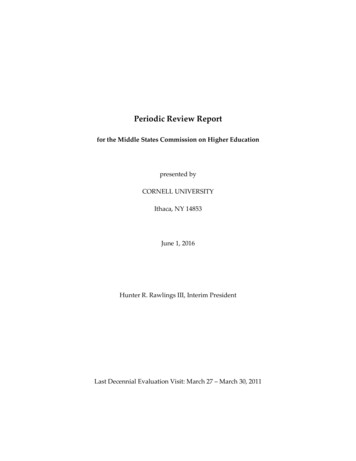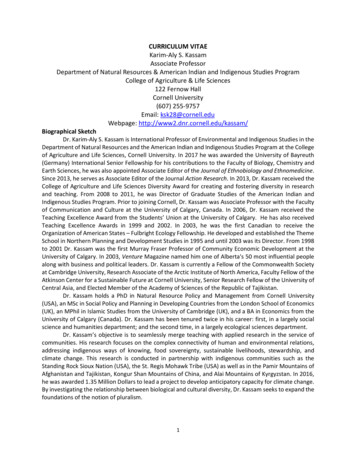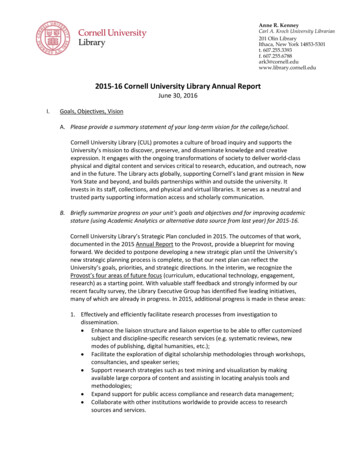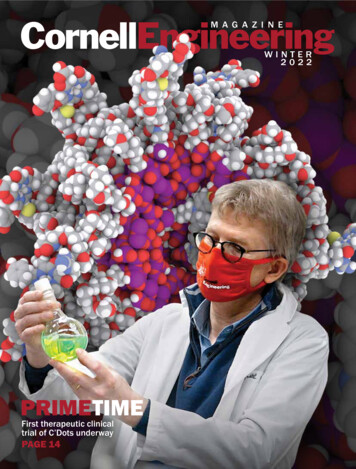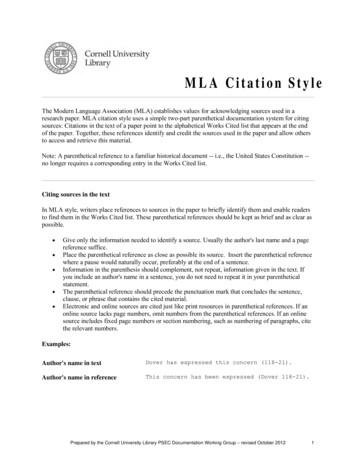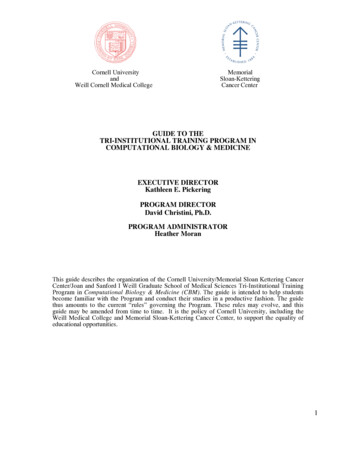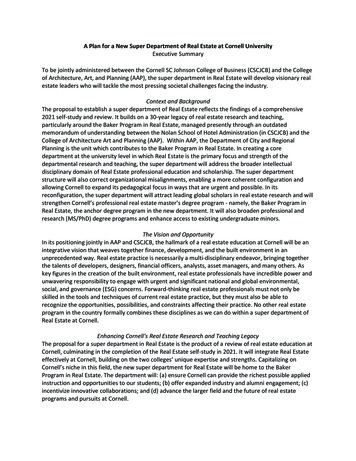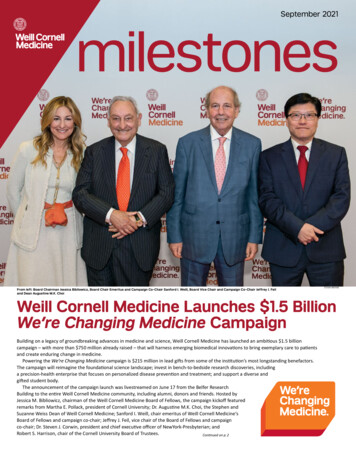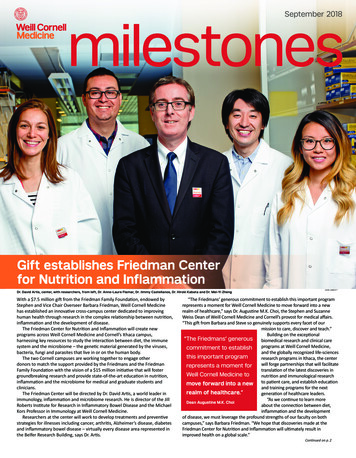
Transcription
milestonesSeptember 2018Gift establishes Friedman Centerfor Nutrition and InflammationDr. David Artis, center, with researchers, from left, Dr. Anne-Laure Flamar, Dr. Jimmy Castellanos, Dr. Hiroki Kabata and Dr. Mei-Yi ZhengWith a 7.5 million gift from the Friedman Family Foundation, endowed byStephen and Vice Chair Overseer Barbara Friedman, Weill Cornell Medicinehas established an innovative cross-campus center dedicated to improvinghuman health through research in the complex relationship between nutrition,inflammation and the development of disease.The Friedman Center for Nutrition and Inflammation will create newprograms across Weill Cornell Medicine and Cornell’s Ithaca campus,harnessing key resources to study the interaction between diet, the immunesystem and the microbiome – the genetic material generated by the viruses,bacteria, fungi and parasites that live in or on the human body.The two Cornell campuses are working together to engage otherdonors to match the support provided by the Friedmans and the FriedmanFamily Foundation with the vision of a 15 million initiative that will fostergroundbreaking research and provide state-of-the-art education in nutrition,inflammation and the microbiome for medical and graduate students andclinicians.The Friedman Center will be directed by Dr. David Artis, a world leader inimmunology, inflammation and microbiome research. He is director of the JillRoberts Institute for Research in Inflammatory Bowel Disease and the MichaelKors Professor in Immunology at Weill Cornell Medicine.Researchers at the center will work to develop treatments and preventivestrategies for illnesses including cancer, arthritis, Alzheimer’s disease, diabetesand inflammatory bowel disease – virtually every disease area represented inthe Belfer Research Building, says Dr. Artis.JOHN ABBOTT“The Friedmans’ generous commitment to establish this important programrepresents a moment for Weill Cornell Medicine to move forward into a newrealm of healthcare,” says Dr. Augustine M.K. Choi, the Stephen and SuzanneWeiss Dean of Weill Cornell Medicine and Cornell’s provost for medical affairs.“This gift from Barbara and Steve so genuinely supports every facet of ourmission to care, discover and teach.”Building on the exceptional“ The Friedmans’ generousbiomedical research and clinical careprograms at Weill Cornell Medicine,commitment to establishand the globally recognized life-sciencesthis important programresearch programs in Ithaca, the centerwill forge partnerships that will facilitaterepresents a moment fortranslation of the latest discoveries inWeill Cornell Medicine tonutrition and immunological researchmove forward into a new to patient care, and establish educationand training programs for the nextrealm of healthcare.”generation of healthcare leaders.“As we continue to learn moreDean Augustine M.K. Choiabout the connection between diet,inflammation and the developmentof disease, we must leverage the profound strengths of our faculty on bothcampuses,” says Barbara Friedman. “We hope that discoveries made at theFriedman Center for Nutrition and Inflammation will ultimately result inimproved health on a global scale.”Continued on p. 2
Gift establishes Friedman Center for Nutrition and Inflammation Continued from coverDiscoverJOHN ABBOTT“One of the most exciting advances in biomedical research and patient careour medical students learn about the science of nutrition and inflammation,is our growing understanding of the influence of diet and nutrition on changesand help to develop new targeted therapies with enormous promise for a rangein the composition of the microbiota – the complex group of organisms livingof devastating diseases.”in and on our bodies – and how these changes“This is a wonderful example of leveraging the strengths ofsubsequently affect our immunity to infectionthe Cornell faculty across its Ithaca and New York City campuses.and our susceptibility to complex diseases,Working together, we can have an even more profound impactincluding asthma, diabetes, inflammatoryon science and medicine,” says Cornell Provost Michael Kotlikoff.bowel disease and cancer,” says Dr. Artis.“We are so grateful for the Friedmans’ foresight and dedication“We have to teach medical students about thisto this burgeoning area of exploration.”emerging area of disease research, we have to“The Friedman Center for Nutrition and Inflammation willfund investigators to do cutting-edge research,be at the forefront of understanding how diet and nutritionand we have to aid our clinical colleagues ininfluence our microbiota and our immune system, and howimplementing new discoveries to improve thethese processes influence susceptibility to disease,” sayslives of patients.”Dr. Artis. “This visionary gift will allow us to applyThe Friedmans have a long history ofVice Chair Overseer Barbara Friedman andrevolutionary technologies that we hope will ultimatelyphilanthropy at Weill Cornell Medicine. They are Dean Augustine M.K. Choiprovide comprehensive, personalized care – a holisticboth Cornell alumni, class of 1959, who have actively supported the university,approach that will take into account each patient’s genetics, diet and lifestyle.”where Barbara Friedman is trustee emerita. She has also served on theThe Friedman family believes that a strong educational component isadvisory board of Weill Cornell Medicine-Qatar and been a member ofcritical to the mission of the center and that future physicians will benefit fromWeill Cornell Medicine’s Board of Overseers since 1993.advanced training in nutrition sciences. “Medical students need to understand“We are extremely grateful to the Friedman family, whose leadershipthat everything we put into our bodies, in addition to our environment, has agift will infuse nutrition science into the medical school curriculum andprofound effect on our overall health,” says Barbara Friedman. “It’s like plantingbuild bridges to the outstanding nutrition programs in Ithaca,’’ says Jessicaseeds – our hope is that these students take this knowledge with them and helpBibliowicz, chairman of the Weill Cornell Medicine Board of Overseers.translate these nutrition research discoveries into meaningful changes in their“Barbara and Steve’s generous support will transform the ways in whichown patients’ lives.”Dr. Costantino Iadecola, at right, with researchers from theFeil Family Brain and Mind Research InstituteJOHN ABBOTTFeil family gift boosts researchIn this celebratory year marking the 20th anniversary of the renamingof Weill Cornell Medicine in honor of Joan and Chair EmeritusSanford I. Weill, we share the stories that showcase our growthacross each facet of our mission to Care, Discover and Teach.The Feil Family Brain and Mind Research Institute (BMRI), establishedat Weill Cornell Medicine in 2013 with a transformational giftof 28 million from the Feil family, has become a researchpowerhouse in neuroscience and neurodegenerative disease.The Feil BMRI, which has nearly doubled its funding fromthe National Institutes of Health (NIH) since its founding,functions as a hub for basic and translational neuroscienceresearch, with more than 50 faculty members involvedin a wide range of investigations related to brain health.Established with the goal of developing breakthrough therapies forpatients with neurological diseases, the Institute is directed by Dr.Costantino Iadecola, the Anne Parrish Titzell Professor of Neurology,professor of neuroscience and a leading neuroscientist in the fields ofcerebrovascular diseases, stroke and dementia.The Institute, which is organized around 11 research clusters,includes the Helen and Robert Appel Alzheimer’s Disease ResearchInstitute – led by newly appointed director Dr. Li Gan – the Center forNeurogenetics, and the Clinical and Translational Neuroscience Unit ,to name a few programs.Philanthropy has been critical to the Feil BMRI’s success, saysDr. Iadecola, noting that donor support has provided for importantresources, including cutting-edge equipment and the recruitment ofworld-class investigators.“We now have the technology, and the analytic ability, to provideanswers to some of the most imposing challenges in brain health,’’says Dr. Iadecola. “We’re on the brink of making tremendousdiscoveries.”Investigators at the Feil BMRI have published more than 400papers in high-impact scientific journals over the past five years,reporting on promising new research in areas including stroke,depression and Alzheimer’s disease. Faculty have also built successfullinks to clinical programs at Weill Cornell Medicine, and providedmentorship to early-career investigators.“My wife, Lee, and I have great admiration – both personally andprofessionally – for Dr. Iadecola and Dr. M. Elizabeth Ross (director ofthe Center for Neurogenetics and the Nathan Cummings Professorin Neurology),” says Vice Chair Overseer Jeffrey Feil. “The FeilFamily Brain and Mind Research Institute is fulfilling its mission toadvance the treatment of neurological disorders and to train the nextgeneration of researchers working in the neurosciences,which is symbolic of the overall spirit of growth at WeillCornell Medicine. Our family has been honored to supportthis important work, which we expect will impact so manypatients for generations to come.”In addition to their extraordinary support forneuroscience research, the Feil family’s legacy ofphilanthropy at Weill Cornell Medicine extends toeducation, and includes the single largest gift for scholarship in thehistory of the institution, as well as a recent 12.5 million gift insupport of the Feil Family Student Center.milestones page 2
Q&AWhat Inspires Giving?Meet Sandra and Edward MeyerSandra and Edward Meyer have been influential leaders and advocates ofWeill Cornell Medicine since 2013. Their generous gift of 75 million that yearresulted in the establishment of the Sandra and Edward Meyer Cancer Center,driving the institution forward as a leader in cancer research and bringingsome of the brightest minds on board.Actively involved as Overseers on Weill Cornell Medicine’s Board since 2014,Mr. and Mrs. Meyer’s ambitious and authentic focus on philanthropy isinspiring. An additional 3 million gift in 2015 established the Sandra andEdward Meyer Professorship of Cancer Research, which was awarded toDr. Silvia Formenti, chairman of the Department of Radiation Oncology.For 36 years, Edward Meyer served as the CEO of Grey Global Group,an advertising and marketing agency, and Sandra Meyer was an interiordesigner, while also focusing on their family – they raised twochildren, Meg and Tony – and community volunteer activities.The Meyers’ support and passion for research continues topropel Weill Cornell Medicine on a successful trajectory asa leader in a vast and competitive cancer research andtreatment space.undergoing great change and there would be considerable progress in theyears to come. We’ve never regretted it for a moment. The progress that’sbeen made here is really astounding. He’s used the funding we provided tobuild a team of remarkable cancer researchers who have put Weill Cornell onpar with the leaders in cancer research, which is exactly what we wanted. Andnow we feel that we’ve become part of the family here.MV: You absolutely have. How did you both first learn about giving back?Is there someone who inspired you to have these philanthropic ideals?SM: My mother. I remember her saying to me when I was little, “It doesn’tmatter how much you give, even if it’s 5. If that’s all you can afford to give,that’s fine.” Giving to others was very important to her.EM: Sandy has always had a very strong feeling that people in difficultcircumstances need to be helped, which is wonderful. I remember thefirst year we rented a house somewhere out on Long Island, Sandyfound a one-pump gas station off the beaten path that was runby an older gentleman. From then on, she told me, “This iswhere you’re going to buy your gas, because this man needsthe help, and the big guys don’t.”The Meyers recently sat down with Mark Veich, WeillCornell Medicine’s vice provost for external affairs, todiscuss the impact of philanthropy on research andwhat inspires their giving.SM: You have to help those less fortunate than you.We’ve been very fortunate, and we see giving as its ownreward.MV: What advice do you have for other donorswho are deciding how and where to give to makea difference?MV: Your family’s generosity has been trulytransformational. Can you tell me about yourexperience as you determined how best andwhere to direct your philanthropy?SM: The first thing I ask friends who are looking to give backis where they are considering making a gift, and of course Itell them, “You must visit Weill Cornell Medicine.” Personally,I don’t think there is anything more important than research,and we believe that Weill Cornell has made outstandingresearch a top priority. But we also feel it’s important tobe involved across the institution, attending meetings andseeing what progress is being made, from the researchersand physicians themselves.SM: At the end of 2013, I lost my closest friend tolung cancer. And in previous years, I lost two verydear friends to cancer as well. We’ve lost severalfamily members from both sides of the family tocancer. I think curing cancer and making progress incancer treatment and research is the most importantthing we could do to help. We felt that not enoughwas being done.SM: Our daughter, Meg, studied biochemistry at Harvard University, andLew Cantley was her professor; 35 years later, he comes back into our livesagain. She still says he was the best professor she ever had.EM: We met with Lew, and he explained to us why this would be a particularlyapt time to make a major gift to cancer research, because the field wasg i ve .w e i l l .c o r n e l l .e d uMV: The Meyer Cancer Center has grown enormously,thanks to your philanthropy, and has made great strides inthe cancer space since 2014. What do you see for the futureof the Meyer Cancer Center and Weill Cornell Medicine?EM: From an institutional point of view, I think that WeillCornell is benefiting and will continue to benefit greatly by anenhanced reputation for leadership in cancer research andtherapies. I think there will be major institutional support forfurther cancer research and for expanding the facilities andcapabilities that this institution provides. That makes me veryoptimistic. I think the future for cancer treatment and researchat this institution is bright because there’s a need for it, a will for itand we’re well on our way.JOHN ABBOTTEM: We saw cancer up close in our family andexperienced how it ravaged people. Giving money todevelop cures for cancer is a hugely satisfying thingto do. We set out to determine where a gift to cancerresearch could be most productive. To do that, we metwith a number of medical institutions, and came to theconclusion that Weill Cornell Medicine was the rightplace for our investment. Here, we found a cancer centerthat was ambitious to grow, and the gifts we gave couldimmediately be put to use. There was a real passionand a commitment to expanding cancer research. Andwhen we learned that Dr. Lewis Cantley (the MeyerDirector of the Sandra and Edward Meyer Cancer Center and a professorof cancer biology at Weill Cornell Medicine) would be involved, we werethoroughly impressed.SM: I can’t stress how important research is, because that’s where the futurelies. That’s where the lives of so many people are going to benefit.EM: We’d like to see an acceleration in the rate of discovery of treatments forcancer. There are still so many types of cancer that go untreated, or if they’retreated, the treatment is not particularly successful. We are hopeful that wecan see real progress toward cures and treatments being made.September 2018 page 3
Weill Cornell MedicineBoard of OverseersJessica M. BibliowiczChairmanRobert J. AppelVice ChairRobert A. BelferVice ChairJeffrey J. FeilVice ChairBarbara B. FriedmanVice ChairSanford I. WeillChair EmeritusAugustine M.K. Choi, MDStephen and Suzanne Weiss DeanCarl F. Nathan, MDDean, Weill Cornell Graduate Schoolof Medical SciencesRobert S. HarrisonChair, Board of Trustees, Cornell UniversityMartha E. Pollack, PhDPresident, Cornell UniversityTarek Abdel-MeguidMadelyn Antoncic, PhDAjay BangaRon BaronHer Highness Sheikha Moza Bint NasserDebra BlackLloyd C. BlankfeinDavid S. Blumenthal, MD ’75Lewis C. Cantley, PhDChelsea V. ClintonDavid M. CohenAlberto CribioreCaroline R. CurryEllen DavisRobert S. DowIra DrukierSanford B. EhrenkranzIsrael A. EnglanderAnne E. EstabrookDavid R. Fischell, PhDCharlotte M. FordHarold E. Ford, Jr.Kelli Olsen FordKenneth C. FrazierRichard M. Fuchs, MDRichard C. GayAntonio M. Gotto, Jr., MD, DPhilPaul A. GouldJeffrey W. GreenbergMaurice R. GreenbergAndrew GriswoldLeonard M. HarlanAlan HartmanJohn A. KanasEvan H. KatzRobert J. KatzMichael M. KellenJames M. KiltsCharles R. LeeThomas H. Lee, MD ’79Michael T. MasinRonay A. MenschelEdward H. MeyerSandra R. MeyerHoward P. MilsteinEdwin H. MorgensStuart Mushlin, MD ’73Spyros NiarchosTimothy O’NeillNancy C. PaduanoNelson PeltzStanley B. Prusiner, MDBruce C. RatnerGene Resnick, MD ’74David N. RobertsZev Rosenwaks, MDRichard G. RubenPaul SalvatoreLewis A. SandersHerbert J. SiegelA.J.C. SmithDaisy M. SorosNan Goldman SwidSamuel O. Thier, MDAndrew H. TischIgor TulchinskyCarolyn WienerBarry WolfLIFE OVERSEERSHushang AnsaryAbby Joseph CohenSamuel FlemingRaymond R. Herrmann, Jr.Harvey Klein, MDArthur MahonRupert MurdochMargaret Osmer-McQuadeFrank H.T. RhodesPatricia Carry StewartHarold TannerRoger J. WeissDEVELOPMENTCOMMITTEE LEADERSHIPRobert J. AppelCo-ChairJeffrey J. FeilCo-ChairMark VeichVice Provost for External AffairsLucille FerraroAssistant Vice Provost forDevelopment
From Our DeanThis year marks the 120thanniversary of the founding ofWeill Cornell Medicine. Since ourinception, this institution has beenpropelled by the commitmentand leadership of so many of ourincredible donors and friends. OurWeill Cornell family of supporters,along with our top-tier facultyand staff, have shaped us into theworld-class academic medicalcenter that we are today and continue to keep us at theforefront of a new era of medicine.2018 also marks 20 years since Weill Cornell Medicinerenamed itself in appreciation of the outstanding andtransformative leadership of Joan and Sanford I. Weill.Through their historic partnership with us, the Weill familyhas been an inspiration, leading the way by investing in ourefforts across each area of our mission. Their support hasbeen vast and varied, driving groundbreaking initiatives inscientific research, medical education and patient care.This dedication to bolstering each area of our three-partmission – and keen appreciation for the many places wherethese areas overlap and intersect – is something that somany of our donors have shown through the years. In thisissue alone, you will read about the Feil, Friedman andMeyer families – all exemplary donors who understandthat each of our efforts to Care, Discover and Teach areinterwoven and driven by the same overarching theme:to deliver the finest care to our patients.As we continue to shape the future of Weill CornellMedicine, we are so grateful to those of you – and thereare so many – who have generously given us your support.With your help, we have become a leader in each area ofour mission, and created a solid foundation on which tobuild. As we look ahead, I anticipate a bright horizon withlimitless potential.With gratitude,Augustine M.K. Choi, MDStephen and Suzanne Weiss Dean, Weill Cornell MedicineProvost for Medical Affairs, Cornell University
Heartfelt gift promotescardiac healthKELSEY FLOYDWhen Dr. David Mortara and Dr. Paul Kligfield met in the mid-1970s, neitherof them imagined they would become fast friends.A former professor at the University of Illinois with a doctorate in physics,Dr. Mortara made a career transition in 1973, pivoting toengineering electrocardiology technology. It was in this newline of work that he met Dr. Kligfield, clinical professor ofmedicine and former director of Weill Cornell Medicine’sElectrocardiography Laboratory, while providing equipmentto what was then New York Hospital. The two shared apassion for electrocardiography and the future of technologyin the cardiology field. In 1982, Dr. Mortara establishedMortara Instrument Inc., a Milwaukee-based firm that madeelectrocardiography devices.Now, nearly 50 years later, Dr. Mortara has fundeda 1 million fellowship in honor of Dr. Kligfield and hisexemplary service, caring for patients and advancing research,Dr. David Mortaraat Weill Cornell Medicine and in the electrocardiographyfield. The Paul D. Kligfield, MD Electrophysiology Fellowship was established toprovide funding to a fellow who is passionate about electrocardiology.“I’m happy to be able to provide funding to sustain someone’s interest inelectrocardiography fundamentals and making the science of healthcare moreSalute to ScholarshipeventsALL PHOTOS BY STUDIO BROOKEprecise,” says Dr. Mortara, founder of the University of California San Francisco(UCSF) Center for Physiologic Research and associate professor at the UCSF Schoolof Nursing. “In the absence of fellowships, it may be tougher for someone tobecome involved in what they’re interested in. I’d love to see some bright, youngpeople, who are developing careers in electrocardiography, benefit from this.”Dr. Kligfield, a leader at Weill Cornell Medicine for the past four decades, sayshe was pleasantly surprised by the dedication.“I’m astonished by the generosity, and it’s a great honor andpleasure to receive this recognition from someone as talented asDave Mortara, who is a true scholar and innovator, and an old friend,”says Dr. Kligfield. “Among other things, we share an appreciation forthe interface of technology and clinical medicine as it relates to theelectrocardiogram.”The first fellowship has been awarded to Dr. Kevin Manocha, athird-year fellow in the Maurice R. and Corinne P. Greenberg Divisionof Cardiology, whose work focuses on electrophysiology.“Without funding, without resources, without time being dedicatedtoward research, it’s difficult to take part in what you’re passionateabout,” says Dr. Manocha. “I’m extremely excited and honored to bechosen for this fellowship.”An active philanthropist in the medical community, Dr. Mortara reflects ongiving back by imagining what he believes will make his grandchildren proud, andwhat they will remember him for, he says.“Giving back is about having purpose in life and leaving the world a better place.”The ninth annual Salute to Scholarship,held May 8 at Olin Hall, celebrated thegenerosity of scholarship donors andshowcased the medical students whobenefit from their philanthropy. Speakersincluded Dr. Yoon Kang, associate dean forprogram development and operations of medical education, andDr. Richard Cohen (MD ’75), clinical professor of medicine.The program concluded with the presentation of the SiegelFamily Student Prizes, funded by Overseer Herbert Siegel andJeanne Siegel. The 25,000 prizes were awarded to eight students.From left: Dr. Steven Corwin, Dr. Bruce Lerman, Overseer Maurice Greenberg,Corinne Greenberg, Dean Augustine M.K. Choi, Dr. Karl KriegerFrom left: Dr. Jessica Clemons (MD ’15), Dr. Tarek Khader (MD ’18), Dr. Asia Gobourne (MD ’18),Dr. Anthony Rossi, Jr. (MD ’08) and Dr. Yoon Kang, were all speakers at Salute to Scholarship in May.Greenberg Award DinnerThe 38th annual Maurice R. Greenberg Distinguished Service Award Dinner, heldat The Plaza on May 17, celebrated two honorees: Dr. Karl Krieger, vice chairmanof the Department of Cardiothoracic Surgery and the Philip Geier Professorof Cardiothoracic Surgery, and Dr. Bruce Lerman, chief of the Maurice R. andCorinne P. Greenberg Division of Cardiology, the Hilda Altschul Master Professorof Medicine and director of the Cardiac Electrophysiology Laboratory atNewYork-Presbyterian/Weill Cornell Medical Center.The award, endowed in 1981 by Overseer Maurice R. Greenberg, who is alsochairman emeritus of the Board of Trustees of NewYork-Presbyterian, has beenpresented annually to senior members of the medical staff for outstandingservice. The event was chaired by Bernadette Castro.Dean’s Circle 21st Annual DinnerThe Dean’s Circle, Weill Cornell Medicine’s alumni giving society for leadershipdonors, held its 21st annual dinner on June 12 at the Belfer Research Building.The event – hosted by Dr. Natasha Leibel (MD ’98), vice president of the WeillCornell Medical College Alumni Association – offered the opportunity for DeanAugustine M.K. Choi to induct new members and recognize advancing membersof the society.Since the founding of the Dean’s Circle in 1997, members have donated morethan 52.6 million to Weill Cornell Medicine.milestones page 4
Weiss Dean of Weill Cornell Medicine and Cornell's provost for medical affairs. "This gift from Barbara and Steve so genuinely supports every facet of our mission to care, discover and teach." Building on the exceptional biomedical research and clinical care programs at Weill Cornell Medicine, and the globally recognized life-sciences
